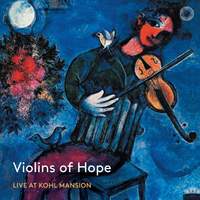Recording of the Week,
Violins of Hope
Today’s Recording of the Week captures a very special concert given at Kohl Mansion just over a year ago, when the Violins of Hope collection was brought to the Bay Area from its home in Tel Aviv to mark the 75th anniversary of the liberation of Auschwitz: restored by Israeli luthiers Moshe and Amnon Weinstein, these extraordinary instruments were previously owned by refugees from Nazi persecution and survivors of the Holocaust, and since 2008 the Weinsteins have ensured that their voices are heard in concert as widely as possible.
 The mainstay of the programme is the world premiere of Jake Heggie’s Intonations, an extraordinary seven-movement song-cycle for mezzo (here the radiant, impassioned Sasha Cooke), solo violin and string quartet, which tells the stories of five specific violins and their owners via texts by Gene Scheer, who drew on conversations with the Weinsteins and James A. Grymes’s book Violins of Hope in order to piece together the histories and personalities behind the instruments. In each case the solo singer represents the violin itself, sometimes acting as omniscient narrator, sometimes addressing its owner directly; Daniel Hope (who plays an instrument previously owned by a member of the Auschwitz-Birkenau Men’s Camp Orchestra) takes on the role of each violinist with enormous eloquence and a palpable emotional investment.
The mainstay of the programme is the world premiere of Jake Heggie’s Intonations, an extraordinary seven-movement song-cycle for mezzo (here the radiant, impassioned Sasha Cooke), solo violin and string quartet, which tells the stories of five specific violins and their owners via texts by Gene Scheer, who drew on conversations with the Weinsteins and James A. Grymes’s book Violins of Hope in order to piece together the histories and personalities behind the instruments. In each case the solo singer represents the violin itself, sometimes acting as omniscient narrator, sometimes addressing its owner directly; Daniel Hope (who plays an instrument previously owned by a member of the Auschwitz-Birkenau Men’s Camp Orchestra) takes on the role of each violinist with enormous eloquence and a palpable emotional investment.
After a vocalise introducing a haunting five-note motif that weaves throughout the cycle, the first movement depicts one of the first violins Amnon Weinstein repaired after it was delivered to his workshop filled with human ashes: from its stark, desiccated opening, the music gradually warms into life as the luthier begins his healing work and restores the violin’s ability to sing. The second movement, Exile, tells the story of the very instrument which second violinist Dawn Harms plays on the recording: as its owner Erich Weininger travels to Palestine by ship after ordeals in Dachau and Buchenwald, the violin wonders if it will be reduced to ashes itself after overhearing the crew frantically calling out for extra fuel.
 A savage, almost Shostakovich-esque scherzo follows in Concert (the dark heart of this exceptionally dark work) as the imprisoned violinist Henry Meyer is commanded to ‘Play something romantic’ for the diversion of a bored Nazi officer and begs his instrument’s forgiveness for obliging in order to save his life: the ensuing sardonic waltz and the violin’s long meditation after the macabre recital has come to an end will stay with you for a long time, and must have been quite overwhelming in the live performance.
A savage, almost Shostakovich-esque scherzo follows in Concert (the dark heart of this exceptionally dark work) as the imprisoned violinist Henry Meyer is commanded to ‘Play something romantic’ for the diversion of a bored Nazi officer and begs his instrument’s forgiveness for obliging in order to save his life: the ensuing sardonic waltz and the violin’s long meditation after the macabre recital has come to an end will stay with you for a long time, and must have been quite overwhelming in the live performance.
The next violinist we meet is rather less compliant, his instrument becoming a vehicle for resistance rather than self-preservation: forced to perform in the Officer’s Club every night, the child prodigy Motele Schlein uses his violin-case to smuggle explosives into the venue, his machinations spurred on by reminiscences of the Mendelssohn concerto and the applause it had won him in a previous life. Less overtly dramatic, but no less affecting, is the tale of Feivel, a youngster bequeathed a violin by a suicidal elderly man whose dying wish is that the instrument continue to bring both joy and financial security to a new generation; it’s followed by a searing, purely instrumental elegy, and a luminous coda in which a second solo violin (representing new life and hope, and written specifically for a young player) joins the ensemble to depict the liberation of Auschwitz.
The other two works are Schubert’s Quartettsatz and Mendelssohn’s String Quartet in F minor Op. 80, performed with febrile intensity by four members of the San Francisco Opera Orchestra: three of the instruments here were rejected by their former owners due to their German provenance and subsequently restored by the Weinsteins, and the homogeneity of their sound is set off nicely by the slightly glassy timbre of Erich Weininger’s violin, which contrasts beautifully with the warm brightness of the instrument played by leader Kay Stern.
But it’s Heggie and Scheer’s remarkable work that lingers longest in the memory: as with their previous collaborations, the treatment of difficult subject-matter is unfailingly direct and sympathetic, avoiding the pitfalls of either crassness or sentimentality, and hearing it performed on some of the very instruments it depicts is moving in the extreme.
Violins of Hope is released on Pentatone next Friday; look out for our interview with Jake Heggie, Daniel Hope and Sasha Cooke about the project next week....
Sasha Cooke (mezzo), Daniel Hope (violin), Sean Mori (violin), Kay Stern (violin), Dawn Harms (violin), Patricia Heller (viola), Emil Miland (cello)
Available Formats: CD, MP3, FLAC, Hi-Res FLAC



